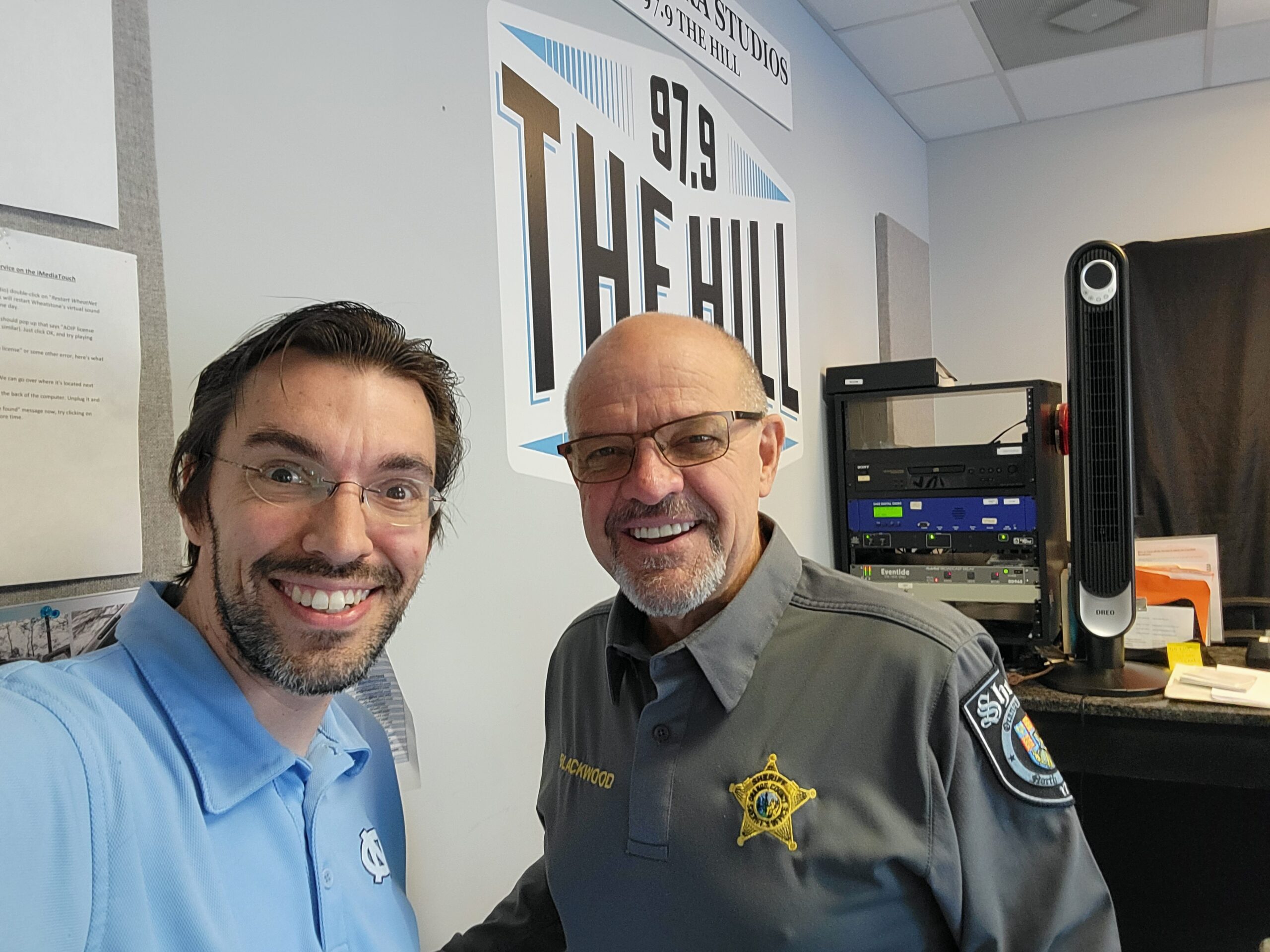Editor’s Note: Beth Velliquette was a longtime reporter for the Herald-Sun who wrote this piece for the family of Lindy Pendergrass. Pendergrass died earlier this month. He served as Orange County Sheriff for more than 30 years before retiring in 2014. This post is being published with Velliquette’s permission.
They say he was a true sheriff, a man who devoted his life to protecting the citizens of Orange County.
Albert Lindy Pendergrass, who was first elected Orange County sheriff in 1982 and continued to be re-elected until he retired in 2014, died Sunday, May 19 at the age of 85 at Duke Hospital with his family and a few close friends at his bedside. He had been struggling with a heart condition and had been in and out of the hospital since January.
One of those close friends was Don Truelove, who worked for Pendergrass for more than 30 years.
“He could be as gruff as any human being on the outside, but he was a marshmallow on the inside,” Truelove said.
He fought for victims of crime and their families but also showed compassion for some perpetrators and their families when he learned about the circumstances of their lives, Truelove said.
“He had as kind of heart for anyone who had been victimized as anyone I’ve ever known,” Truelove said.
Pendergrass was born on May 13, 1934 and grew up in Carrboro on Laurel Avenue, according to his son, Kemp Pendergrass. His parents had eight children, and Lindy Pendergrass was the oldest.
“They were beyond dirt poor,” Kemp Pendergrss said. “They didn’t have a thing. My father learned how to work at a very young age because he supported his family.”
As a kid, he delivered papers, shoveled coal, hauled rock, stocked shelves at the A&P, and after he became a police officer at the Chapel Hill Police Department, he often moonlighted unloading boxes at stores, working security, anything to help support his mother and his siblings after his father passed away.
His wife, Sue Pendergrass, was in high school when she first met him and remembered how he knocked on her door one day at her home in White Cross.
“He said, “Would you like to go to the movies tomorrow night?” Sue Pendergrass said.
Her parents gave the OK, and after that they just kept dating until he joined the Marines. When he returned home, he and Sue started dating again and married in 1954. They had two children, a son, Kemp, and a daughter, Kitza.
They bought a brick house on Severin Street in Chapel Hill, and they were happy there and didn’t see the need to move to a fancier or bigger house as he moved up in his career and began making more money. Once when Kemp bought him a new pair of tennis shoes as a present, his father told him to take them back. His 15-year-old tennis shoes were good enough.
Carrboro and Chapel Hill were small towns when he first started his law enforcement career, and when he joined the Chapel Hill Police Department in 1957, there were only nine officers, so nearly everybody in town got to know him as he walked his beat on Franklin Street. When kids came around, he pulled out a deck of cards and did some card tricks as he talked to them about becoming good citizens.
After rising through the ranks to lead the investigation unit, in 1982, he took a leave of absence from the police department and ran for sheriff. Although he didn’t like to draw attention to himself, he felt the sheriff’s office could use some improvement, according to Truelove, who worked with him at the Chapel Hill Police Department and then followed him to the sheriff’s office.
“In 1982, the sheriff’s office for Orange County was in significant need of improvement,” Truelove said.
Only four cars were totally operational, and the others didn’t have walkie-talkies or radios and some of the deputies were using their own guns when they were on duty.
“The sheriff’s office was in drastic need of upgrading,” he said. “It was being left behind.”
When Pendergrass became sheriff, he immediately began working to bring things up to date. He bought surplus vehicles from the highway patrol, obtained grants for new radios and grants to improve the jail.
He sent his deputies to various schools and training sessions to help them become more professional.
He did not like the limelight and once during a large campaign barbecue, people looked around and couldn’t find him. He was supposed to be out there talking to folks, shaking hands and asking for their votes. They found him back in the kitchen washing the pots and pans and had to tell him, “Come on. Get out there and talk to the people.”
An early riser, he woke upat 4 a.m.every morning to go to work, Kemp Pendergrass said. He always ate lunch at his desk, sometimes eating a package of crackers as he leaned over the trash can to catch the crumbs.
When he wasn’t at the office or going on calls himself, he was still always on the job. Sometimes on weekends, he’d go on patrol and answer calls himself.
At home he had a big police scanner in the living room and another one next to his recliner, and if he heard a significant call on the radio at 2 or3 a.m., he’d jump up and be out the door and head to the call himself.
He had no hobbies. The sheriff’s office was his life and his work and his hobby. “He loved that sheriff’s department in Orange County,” Kemp Pendergrass said.
Orange County Sheriff CharlesBlackwood, who worked with Pendergrass since 1982 and succeeded him after he retired, said Pendergrass could be a tough boss. He could be hard to please sometimes, but now thatBlackwoodis sheriff, he said he understands better why Pendergrass would sometimes reject his projects and tell him to go back and make it better.
Pendergrass didn’t talk about the things he did for others. Since he rarely missed a day of work because he didn’t take vacations, he had built up quite a cache of sick days. When one of his deputies got cancer, he donated all his sick days to that deputy to help support the deputy’s family. Kemp Pendergrass said.
“One of the most important things I learned from him was to treat people as individuals,” Kemp Pendergrass said. “He didn’t care if you were black, white, green, purple, gay, straight, tall or short.”
Larry Faucette, who retired as a captain of investigations several years ago, started off as a deputy back in 1983. Pendergrass always asked for more from his deputies and expected them to be a professional and properly represent the sheriff’s office when they were out on calls.
He expected deputies to do the right thing.
“When you didn’t do what you were supposed to do, he let you know about it,” Faucette said.
But the sheriff’s office was a good place to work.
“It was some of the happiest times of my life working down there,” Faucette said.
“He was a true sheriff,” Faucette said. “He looked after the citizens of Orange County.”
Lindy Pendergrass is survived by his wife, Sue, daughter, Kitza, and son, Kemp, and grandson, Carver, as well as his brothers, Ronnie Pendergrass, Harold Pendergrass, Donnie Pendergrass. and his sister, Jane Pendergrass.
His father, Albert Luther Pendergrass, his mother, Ruth Mae Bowden Pendergrass, a baby brother who died at birth, and his sisters, Carolyn and Catherine predeceased him.
Visitation will be Thursday at 11 a.m. followed by services at noon at the Chapel Hill Bible Church at 260 Erwin Road in Chapel Hill. Burial will follow at Westwood Cemetery on Davie Road in Carrboro.






